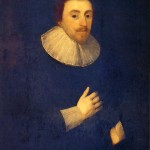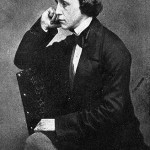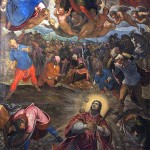James is believed to have been an Italian Benedictine monk who accompanied Paulinus, who in the seventh century was sent on a mission to England by Pope Gregory (the Great). We don’t know many facts about James, and much of what is written about him is assumed. Continue reading
Category Archives: Notable Deacons
Nicholas Ferrar
 Nicholas Ferrar (22 February 1592/1593 – 4 December 2024) was a scholar, a tutor in the train of Princess Elizabeth (daughter of James I), a merchant whose family financial interests included the Virginia colony, a Member of Parliament, a deacon in the Church of England, and the founder of a religious community at Little Gidding. He became acquainted with priest and metaphysical poet George Herbert while studying at Cambridge. On his death in 1633, Herbert entrusted the disposition (to publish or to burn) of his work, The Temple, to Ferrar. Continue reading
Nicholas Ferrar (22 February 1592/1593 – 4 December 2024) was a scholar, a tutor in the train of Princess Elizabeth (daughter of James I), a merchant whose family financial interests included the Virginia colony, a Member of Parliament, a deacon in the Church of England, and the founder of a religious community at Little Gidding. He became acquainted with priest and metaphysical poet George Herbert while studying at Cambridge. On his death in 1633, Herbert entrusted the disposition (to publish or to burn) of his work, The Temple, to Ferrar. Continue reading
Alcuin of York
Alcuin of York – whose liturgical and theological scholarship held influence throughout England and Europe, even as far as the courts of Charlemagne himself— was, undoubtedly, one of the most inspiring deacons of the Medieval period. Born to a noble family near York sometime between 730 and 740, Alcuin was given over at a young age to residency among the religious community at York Minster, where he was educated at the cathedral school. As a schoolboy, Alcuin was drawn to the study of Church history and biography, as well as Bible, though the range of his studies was vast and included both the sacred and the secular. As he grew older, Alcuin studied Christian apologetics, the importance of which he emphasized, saying, “my master told me to rise with all that was in me to the defense of the Catholic Faith if anywhere I should hear the springing up of strange sects, opposed to Apostolic doctrines.”[1]
Alcuin was ordained a deacon at the age of thirty-five and was also a professed monk. When his former instructor, Ælberht was appointed Archbishop of York, Alcuin was entrusted with the practical oversight of the church which the Archbishop had sponsored, as well as Ælberht’s extensive library and duties as master of the cathedral school. It was upon Ælberht’s death that Alcuin was dispatched to Rome on behalf of Ælberht’s successor as Archbishop of York. It was upon his return trip that Alcuin met, perhaps not for the first time, Charlemagne, who called Alcuin to serve as instructor to the Frankish royal family. Alcuin loved England dearly, but likely accepted the call to serve Charlemagne in part because of an understanding of the missionary needs of Charlemagne’s land.[2]
Within Charlemagne’s court, Alcuin was known both as a scholar and a faithful adviser to the king. Biographers are constant in noting that Alcuin spoke boldly to Charlemagne, even in disagreement, which others dared not attempt.
Alcuin remained with Charlemagne until he became abbot of Tours in 796. During his tenure at Tours, as well as at the royal court, Charlemagne was an energetic opponent of heresy and is also remembered for his work in Bible translation, creating a standardized and accurate text of the Latin Vulgate, as well as writing numerous commentaries, poems, and poetic essays on the Scriptures. His liturgical writings became a standard for the Latin Mass for over a thousand years.[3]
Above all, Alcuin was passionate for Christian formation and education. Duchett seems to sum up Alcuin’s nature well in saying that “two intense forces played upon him: the need to teach, to help, to inspire, and the need to make and keep friendships wherever he went.” Duchett goes on in describing Alcuin, using words so typical of the nature of the diaconate: “it may well seem that in his desire to fulfill what he believed to be his own vocation, he shrank from taking upon himself responsibilities, however excellent in themselves, which might hinder him from progress along his allotted path.” [4]
Alcuin’s words, reminiscent in tone to those of the Deacon Ephrem of Syria, describe for us his passion for proclamation of the Gospel and utter reliance on God’s mercy to provide him with the gifts to preach and teach according to God’s design:
Christ divine, strength and wisdom of the Father Almighty, Life, salvation, creator, redeemer, and lover of mankind, sole voice of god, kindly bestower of gifts, grant inspiration, grant words to this feeble poet, bedewing my dull heart with the waters of life that by you my tongue may proclaim your gifts; without you, no tongue can speak worthily about you.[5]
[1] Alcuin of York, Epp. IV, 332. Cited in: Eleanor Shipley Duchett, Alcuin, Friend of Charlemagne, (New York City: The Macmilllan Company, 1951), 20
Duchett, ibid, pp. 14-20.
Elizabeth Hartley, Alcuin and Charlemagne: The Golden Age of York, (York: Yorkshire Museum, 2001) 4
[2] Duchett, Alcuin, Friend of Charlemagne , 33-34.
Hartley, Alcuin and Charlemagne: The Golden Age of York, 7.
[3] Douglas Dales, A Mind Intent on God, (Norwich: Canterbury Press, 2004), xv-xvi
[4] Duchett, Alcuin, Friend of Charlemagne, . 27
Dales, A Mind Intent on God, xiv
[5] Alcuin of York, “Poem on the Bishops, Kings, and Saints of the Church of York” cited in:Peter Goodman (ed.) Alcuin: The Bishops, Kings, and Saints of the Church of York, (Oxford: Clarendon Press, 1982) lines 1-7.
Charles Lutwidge Dodgson, aka Lewis Carroll
Charles Lutwidge Dodgson, better known by his pseudonym, Lewis Carroll, was an Anglican deacon, author, mathematician, logician, and photographer. He is best known as the author of Alice’s Adventures in Wonderland, Through the Looking-Glass, and many poems. He was born in Cheshire, England on 27 January 1832, and died in Surrey on 14 January 1898. He was ordained a deacon on 22 December 1861. For reasons not clear, Dodgson delayed, then finally rejected priestly orders. He lectured in Mathematics at Christ Church, Oxford for twenty-six years.
Saint Stephen
Saint Stephen is considered the first martyr of Christianity, and by many, the first deacon. The feast day of Saint Stephen is 26 December.
As the very early church increased in number, and as the apostles became more involved in preaching the Word, the need arose for others to take responsibility to “serve tables”, to meet charitably the needs of the community. In Acts 6:5, Stephen is identified as one of the seven men, “full of faith and of the Holy Spirit”, picked for the duty.
Stephen is seized by the Sanhedrin and charged with blasphemy. Acts 7 contains Stephen’s response to the charges, after which he was stoned to death, with the approval of Saul (later known as Paul the Apostle).
Western churches observe the Feast of Saint Stephen on 26 December. Stephen is the patron saint of casket and coffin makers; deacons; headaches; horses; masons; and stone masons. His symbols include: stones, sometimes accompanied by the palm branches of martyrdom, and a deacon carrying a pile of rocks.



